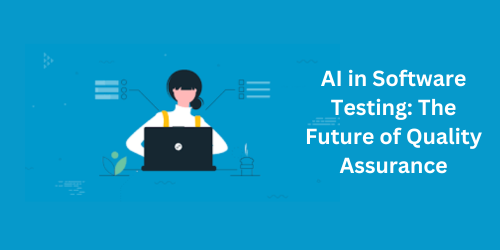In the ever-evolving landscape of software development, quality assurance (QA) plays a pivotal role in ensuring that the end product meets or exceeds customer expectations. Traditionally, QA has relied on manual testing processes that are time-consuming, resource-intensive, and prone to human error. However, with the advent of Artificial Intelligence (AI), the future of quality assurance is being reshaped in ways that were once considered science fiction.
The Rise of AI in Quality Assurance
Artificial Intelligence, particularly machine learning and automation, has become a transformative force in many industries, and software testing is no exception. In quality assurance, AI offers the promise of accelerated testing, improved test coverage, cost efficiency, and in-depth bug detection.
Accelerated Testing: AI-driven testing tools can execute test cases at speeds unimaginable to human testers. Automated testing platforms leverage AI to perform extensive regression testing, ensuring that new code changes do not break existing functionality. This high-speed execution accelerates the overall testing process.
Improved Test Coverage: The complexity of modern software requires an extensive test coverage that encompasses various operating systems, devices, and scenarios. AI algorithms analyze applications and user behaviors to identify the most critical areas to test, thereby maximizing the effectiveness of testing efforts.
Cost Efficiency: While implementing AI in testing may require an initial investment, the long-term benefits in cost savings are substantial. Automated tests run 24/7 without the need for rest or compensation, significantly reducing labor costs.
In-Depth Bug Detection: AI tools utilize machine learning to predict which test cases are likely to uncover defects. They can even pinpoint potential causes of issues, providing developers with actionable insights for faster issue resolution.
AI Testing Models
AI in software testing encompasses various techniques and models that revolutionize the way testing is conducted:
Machine Learning Testing: Machine learning models can predict where defects are most likely to occur. By analyzing historical data, they can identify high-risk areas and prioritize test case execution accordingly.
Predictive Analysis: AI-driven testing tools analyze user data and application usage patterns to predict the test scenarios that are most relevant. This ensures that testing focuses on critical user pathways.
Performance Testing: AI enhances performance testing by simulating real-world scenarios and loads, helping identify performance bottlenecks and areas for optimization.
Data-Driven Insights: AI can process vast amounts of testing data to provide insights into software quality and performance. These insights are invaluable for decision-making and issue resolution.
Continuous Testing: Continuous testing is an agile approach that involves automated testing at every stage of the software development lifecycle. AI plays a vital role in enabling continuous testing by providing rapid feedback.
Benefits of AI in Software Testing
The integration of AI into quality assurance offers a plethora of benefits:
Faster Release Cycles: AI’s rapid execution of test cases allows for faster release cycles, a critical advantage in today’s fast-paced software development environment.
Enhanced Reliability: AI-driven testing tools minimize human error, leading to more reliable test results. Automated tests consistently follow predefined test cases without deviation.
Improved User Experience: AI can identify user experience issues and bugs that might go unnoticed in manual testing. A seamless user experience is a significant factor in a software’s success.
Resource Efficiency: AI’s 24/7 testing capabilities reduce the need for extensive human resources, significantly reducing labor costs and time.
Cost Reduction: While the initial investment in AI testing tools can be significant, the long-term cost savings from automated testing make it a cost-effective solution.
Challenges and Ethical Considerations
Despite the immense potential, there are challenges associated with the integration of AI in software testing. Some of these include:
Data Quality: AI’s effectiveness depends on the quality of training data. Poor quality or biased data can lead to inaccurate test results.
Resource Allocation: Deciding which tests should be automated and which require human oversight is a challenge. Inadequate resource allocation can lead to a false sense of security.
Ethical Concerns: The collection and analysis of user data for testing purposes raise privacy and ethical concerns. Proper data handling and compliance with data protection regulations are essential.
Human Oversight: While AI testing is highly efficient, human testers still play a crucial role in defining test cases, maintaining test suites, and making informed decisions.
AI Expertise: The successful implementation of AI in testing requires specialized knowledge and skills. Organizations need to invest in training or hire AI experts.
The Future of Software Testing
The future of software testing is increasingly AI-enhanced. As AI continues to advance, it will have an even more profound impact on the field. Here are some key trends to watch:
AI-Driven Test Maintenance: AI will automate the maintenance of test suites, adapting tests to evolving software, reducing the manual effort required.
AI in Security Testing: AI will play a more significant role in identifying vulnerabilities and security issues in software, helping secure digital ecosystems.
AI in Test Case Generation: AI will be able to generate test cases automatically based on specifications, making the process even more efficient.
AI-Enhanced Test Reporting: AI will provide more in-depth insights into test results, assisting in issue diagnosis and resolution.
AI in Test Environments: AI can optimize test environments for more
Conclusion
AI in software testing is a transformative force that holds the promise of making software development and quality assurance more efficient, reliable, and user-friendly. As artificial intelligence and machine learning technologies continue to evolve, the field of software testing will experience a paradigm shift.
The adoption of AI-driven testing tools and practices enables faster testing, broader test coverage, cost efficiency, and more in-depth bug detection. This transformation empowers software development teams to achieve faster release cycles, enhance reliability, and deliver a superior user experience.
However, while AI in software testing presents exciting opportunities, it is essential to address challenges related to data quality, resource allocation, and ethical considerations. As the industry matures, the collaborative efforts of human testers and AI-driven tools will be central to quality assurance.
The future of software testing is now, and it’s AI-enhanced. Those equipped with AI and software testing skills will find themselves at the forefront of this technological revolution. In a world where software quality is paramount, AI-driven testing is not just a luxury but a necessity.
Welcome to the future of software testing, where AI empowers us to build more reliable, efficient, and user-friendly software products.
Keywords: AI in software testing, quality assurance, software development, automated testing, machine learning, predictive analysis, bug detection, performance testing, data-driven insights, continuous testing, AI testing models, future of software testing, AI-enhanced testing, AI-driven test maintenance, AI in security testing, AI in test case generation, AI-enhanced test reporting, AI in test environments, human-AI collaboration in testing, best software testing course in Nashik, Ahmedabad, Kota and all locations in India.



